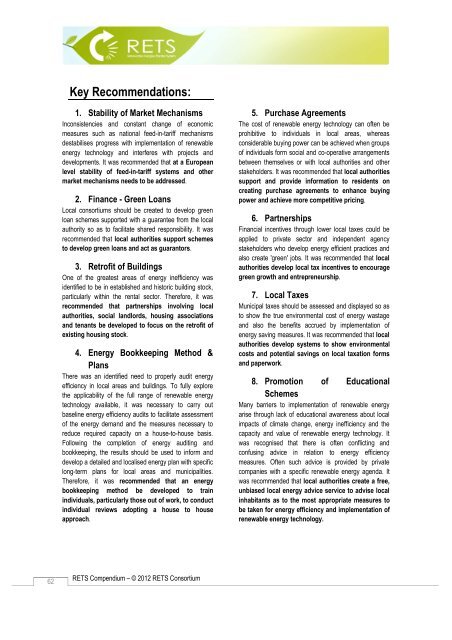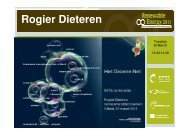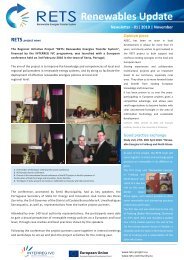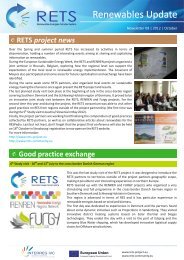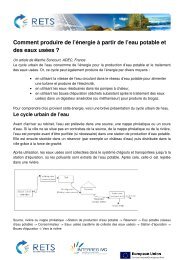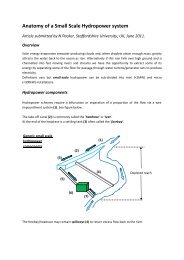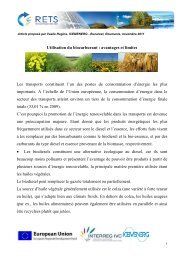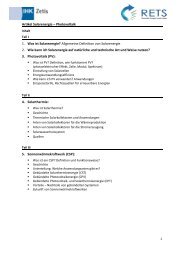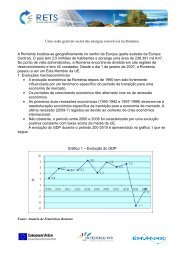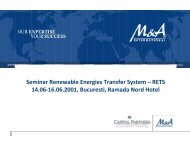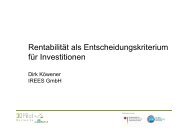Promoting renewable energies - RETS Project
Promoting renewable energies - RETS Project
Promoting renewable energies - RETS Project
Create successful ePaper yourself
Turn your PDF publications into a flip-book with our unique Google optimized e-Paper software.
Key Recommendations:<br />
1. Stability of Market Mechanisms<br />
Inconsistencies and constant change of economic<br />
measures such as national feed-in-tariff mechanisms<br />
destabilises progress with implementation of <strong>renewable</strong><br />
energy technology and interferes with projects and<br />
developments. It was recommended that at a European<br />
level stability of feed-in-tariff systems and other<br />
market mechanisms needs to be addressed.<br />
2. Finance - Green Loans<br />
Local consortiums should be created to develop green<br />
loan schemes supported with a guarantee from the local<br />
authority so as to facilitate shared responsibility. It was<br />
recommended that local authorities support schemes<br />
to develop green loans and act as guarantors.<br />
3. Retrofit of Buildings<br />
One of the greatest areas of energy inefficiency was<br />
identified to be in established and historic building stock,<br />
particularly within the rental sector. Therefore, it was<br />
recommended that partnerships involving local<br />
authorities, social landlords, housing associations<br />
and tenants be developed to focus on the retrofit of<br />
existing housing stock.<br />
4. Energy Bookkeeping Method &<br />
Plans<br />
There was an identified need to properly audit energy<br />
efficiency in local areas and buildings. To fully explore<br />
the applicability of the full range of <strong>renewable</strong> energy<br />
technology available, it was necessary to carry out<br />
baseline energy efficiency audits to facilitate assessment<br />
of the energy demand and the measures necessary to<br />
reduce required capacity on a house-to-house basis.<br />
Following the completion of energy auditing and<br />
bookkeeping, the results should be used to inform and<br />
develop a detailed and localised energy plan with specific<br />
long-term plans for local areas and municipalities.<br />
Therefore, it was recommended that an energy<br />
bookkeeping method be developed to train<br />
individuals, particularly those out of work, to conduct<br />
individual reviews adopting a house to house<br />
approach.<br />
5. Purchase Agreements<br />
The cost of <strong>renewable</strong> energy technology can often be<br />
prohibitive to individuals in local areas, whereas<br />
considerable buying power can be achieved when groups<br />
of individuals form social and co-operative arrangements<br />
between themselves or with local authorities and other<br />
stakeholders. It was recommended that local authorities<br />
support and provide information to residents on<br />
creating purchase agreements to enhance buying<br />
power and achieve more competitive pricing.<br />
6. Partnerships<br />
Financial incentives through lower local taxes could be<br />
applied to private sector and independent agency<br />
stakeholders who develop energy efficient practices and<br />
also create 'green' jobs. It was recommended that local<br />
authorities develop local tax incentives to encourage<br />
green growth and entrepreneurship.<br />
7. Local Taxes<br />
Municipal taxes should be assessed and displayed so as<br />
to show the true environmental cost of energy wastage<br />
and also the benefits accrued by implementation of<br />
energy saving measures. It was recommended that local<br />
authorities develop systems to show environmental<br />
costs and potential savings on local taxation forms<br />
and paperwork.<br />
8. Promotion of Educational<br />
Schemes<br />
Many barriers to implementation of <strong>renewable</strong> energy<br />
arise through lack of educational awareness about local<br />
impacts of climate change, energy inefficiency and the<br />
capacity and value of <strong>renewable</strong> energy technology. It<br />
was recognised that there is often conflicting and<br />
confusing advice in relation to energy efficiency<br />
measures. Often such advice is provided by private<br />
companies with a specific <strong>renewable</strong> energy agenda. It<br />
was recommended that local authorities create a free,<br />
unbiased local energy advice service to advise local<br />
inhabitants as to the most appropriate measures to<br />
be taken for energy efficiency and implementation of<br />
<strong>renewable</strong> energy technology.<br />
62<br />
<strong>RETS</strong> Compendium – © 2012 <strong>RETS</strong> Consortium


